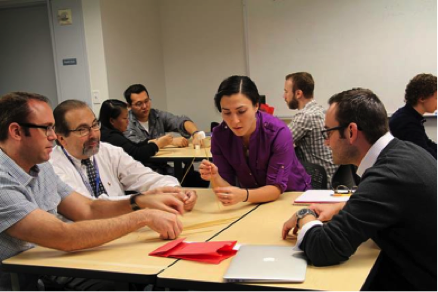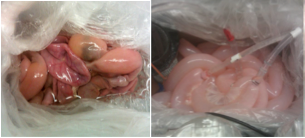Making a Difference
I came to Yale SOM because I believed that it gave me the best shot at working with a stellar multi-disciplinary team to solve unaddressed healthcare problems and make a difference in patients’ lives.

I came to Yale SOM because I believed that it gave me the best shot at working with a stellar multi-disciplinary team to solve unaddressed healthcare problems and make a difference in patients’ lives. This past fall, I was fortunate enough to join such a team through the Technology Commercialization Program at the Yale Entrepreneurial Institute (YEI). The team includes myself and Jen Gaze (both first year MBA students), Dr. John Geibel (Yale School of Medicine), and Dr. Joseph Zinter (School of Engineering and Applied Sciences/CEID).
Together, we’ve formed Revai, a company built around technology developed in MENG 404, a course on medical device design and innovation that Dr. Zinter teaches at the Center for Engineering Innovation & Design. This technology allows us to help individuals with severe intestinal issues.
About 20,000 people in the US suffer from short bowel syndrome. They’ve lost over half of their intestines, receive nutrition intravenously, and experience upwards of 40 bowel movements a day. Needless to say, quality of life can be extremely low. Also, treatment costs upwards of $200,000 a year and puts patients at risk of liver failure, blood clots, and serious infection.
The only solution to short bowel syndrome is to receive an intestinal transplant. And yet there are only 100 intestinal transplants performed each year, even though there are over 8,000 donor grafts available. The main reason that so few transplants are performed is that intestines are full of bacteria and degrade quickly, so you can’t transport them very far given that the current standard of care is a cooler with ice. This means that a lot of patients have no way to access healthy donor organs.

of care (L) and using the Revai IPU (R).
Our solution is the Revai Intestinal Preservation Unit (IPU). It’s a patent-protected system that pumps fluid through the intestine to keep it healthy during transportation. Both pig and human tests have shown that using the device can stop organ degradation for 8 hours. This will allow us to expand the donor network, provide better organs, increase transplant success rates, improve patient quality of life, and drastically reduce healthcare costs.
With the Revai IPU, we can save patients and give them their lives back.
This semester, Jen and I are taking MGT 646, Start-up Founder Practicum, where we can get credit for all the work we’re putting into our venture. In general, SOM has been incredibly supportive of our efforts and I would encourage any student interested in entrepreneurship to check out all of the resources available through the Program on Entrepreneurship.
